

Your Inner Mind Is a Work of Imagination. A whole lot of books on the brain are published these days and you can read yourself into a coma trying to make sense of their various messages.

So it was with my usual low-burn curiosity that I starting reading The Mind Is Flat by British behavioral scientist Nick Chater. At least the title is intriguing. But as I started reading it, I perked right up. Maybe that’s because it starts with a long riff on Anna Karenina and asks us to plumb the motivations of her suicide. Can we explain them? Chater writes it makes no difference that Anna is a fictional character. Well, then, I thought, if Chater keeps up this audacious tone, The Mind Is Flat is going to be anything but flat. Nevertheless, I raced through The Mind Is Flat fascinated. Are you saying psychotherapy that tries to alleviate pain by bringing unconscious motives to the surface is … Doomed? Yes, doomed. It’s doomed by the fact that there is not a deep inner story that is hiding from you. I do, yes. If only it were that easy.
To Make Sense of the Present, Brains May Predict the Future. But in spite of the clear role that generative models and expectations play in brain function, scientists have yet to pinpoint exactly how that’s implemented at the level of neural circuits. “The Bayesian brain story is relatively agnostic about what the underlying mechanisms are,” said Mark Sprevak, a professor of philosophy of mind at the University of Edinburgh in Scotland. Enter predictive coding theory, which offers specific formulations of how brains can be Bayesian. The Mind-Expanding Ideas of Andy Clark. Where does the mind end and the world begin?
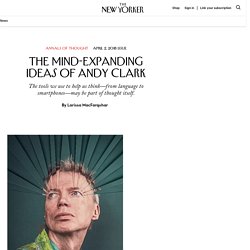
Is the mind locked inside its skull, sealed in with skin, or does it expand outward, merging with things and places and other minds that it thinks with? What if there are objects outside—a pen and paper, a phone—that serve the same function as parts of the brain, enabling it to calculate or remember? You might say that those are obviously not part of the mind, because they aren’t in the head, but that would be to beg the question.
So are they or aren’t they? Consider a woman named Inga, who wants to go to the Museum of Modern Art in New York City. Before Inga consulted her memory or Otto his notebook, neither one of them had the address “Fifty-third Street” consciously in mind; but both would have said, if asked, that they knew where the museum was—in the way that if you ask someone if she knows the time she will say yes, and then look at her watch. In Clark’s opinion, this is an excellent thing. How Did Consciousness Evolve? Ever since Charles Darwin published On the Origin of Species in 1859, evolution has been the grand unifying theory of biology.
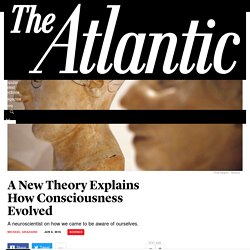
Yet one of our most important biological traits, consciousness, is rarely studied in the context of evolution. Theories of consciousness come from religion, from philosophy, from cognitive science, but not so much from evolutionary biology. Consciousness Goes Deeper Than You Think - Scientific American Blog Network. The hard problem of consciousness is a distraction from the real one.
What is the best way to understand consciousness?
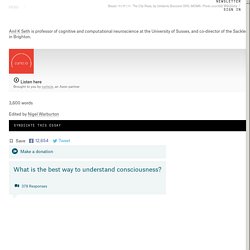
In philosophy, centuries-old debates continue to rage over whether the Universe is divided, following René Descartes, into ‘mind stuff’ and ‘matter stuff’. But the rise of modern neuroscience has seen a more pragmatic approach gain ground: an approach that is guided by philosophy but doesn’t rely on philosophical research to provide the answers. Its key is to recognise that explaining why consciousness exists at all is not necessary in order to make progress in revealing its material basis – to start building explanatory bridges from the subjective and phenomenal to the objective and measurable.
Could machines have become self-aware without our knowing it? Usually when people imagine a self-aware machine, they picture a device that emerges through deliberate effort and that then makes its presence known quickly, loudly, and (in most scenarios) disastrously.
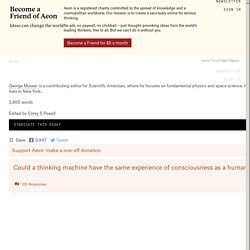
Even if its inventors have the presence of mind not to wire it into the nuclear missile launch system, the artificial intelligence will soon vault past our capacity to understand and control it. What is the self if not that which pays attention? You have thoughts, feelings and desires.

You remember your past and imagine your future. Sometimes you make a special effort, other times you are content to simply relax. All of these things are true about you. But do you exist? Is your sense of self an illusion, or is there something in the world that we can point to and say: ‘Ah, yes – that is you’? Roger Penrose Discusses Consciousness. Once you start poking around in the muck of consciousness studies, you will soon encounter the specter of Sir Roger Penrose, the renowned Oxford physicist with an audacious—and quite possibly crackpot—theory about the quantum origins of consciousness.
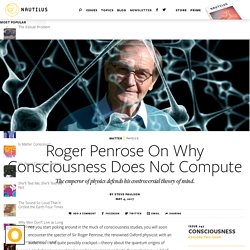
He believes we must go beyond neuroscience and into the mysterious world of quantum mechanics to explain our rich mental life. No one quite knows what to make of this theory, developed with the American anesthesiologist Stuart Hameroff, but conventional wisdom goes something like this: Their theory is almost certainly wrong, but since Penrose is so brilliant (“One of the very few people I’ve met in my life who, without reservation, I call a genius,” physicist Lee Smolin has said), we’d be foolish to dismiss their theory out of hand. Penrose doesn’t seem to mind being branded a maverick, though he disputes the label in regard to his work in physics.
Penrose’s theory promises a deeper level of explanation. Also in Physics By Amanda Gefter. Materialism alone cannot explain the riddle of consciousness. Materialism holds the high ground these days in debates over that most ultimate of scientific questions: the nature of consciousness.
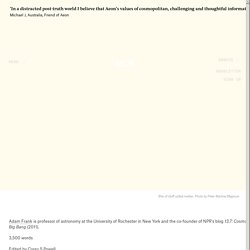
When tackling the problem of mind and brain, many prominent researchers advocate for a universe fully reducible to matter. ‘Of course you are nothing but the activity of your neurons,’ they proclaim. That position seems reasonable and sober in light of neuroscience’s advances, with brilliant images of brains lighting up like Christmas trees while test subjects eat apples, watch movies or dream. Is Consciousness an Illusion? From Bacteria to Bach and Back: The Evolution of Minds by Daniel C.
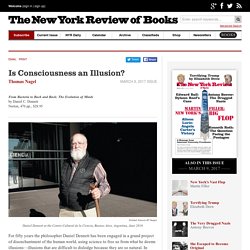
Dennett Norton, 476 pp., $28.95 For fifty years the philosopher Daniel Dennett has been engaged in a grand project of disenchantment of the human world, using science to free us from what he deems illusions—illusions that are difficult to dislodge because they are so natural. In From Bacteria to Bach and Back, his eighteenth book (thirteenth as sole author), Dennett presents a valuable and typically lucid synthesis of his worldview. Dennett is always good company. Look into my eyes: how hypnosis works is a partnership. It’s surprising how stressful the first time can be.
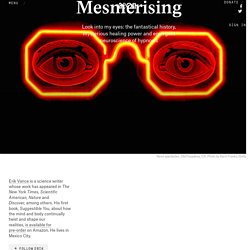
For months now, I’ve been researching the history of hypnosis for a book on the power of suggestion. But no study of hypnosis would be complete without trying it myself. A New Spin on the Quantum Brain. Palliative Care and the Science of What It Feels Like to Die. “Do you want to know what will happen as your body starts shutting down?”
My mother and I sat across from the hospice nurse in my parents’ Colorado home. It was 2005, and my mother had reached the end of treatments for metastatic breast cancer. A month or two earlier, she’d been able to take the dog for daily walks in the mountains and travel to Australia with my father. Now, she was weak, exhausted from the disease and chemotherapy and pain medication.
My mother had been the one to decide, with her doctor’s blessing, to stop pursuing the dwindling chemo options, and she had been the one to ask her doctor to call hospice. During six-and-a-half years of treatment, although my mother saw two general practitioners, six oncologists, a cardiologist, several radiation technicians, nurses at two chemotherapy facilities, and surgeons at three different clinics—not once, to my knowledge, had anyone talked to her about what would happen as she died.
There’s good reason. The brain's I. Consciousness: The Mind Messing With the Mind. This longstanding conundrum — the mind-body problem — was succinctly described by the philosopher David Chalmers at a recent symposium at The New York Academy of Sciences. “The scientific and philosophical consensus is that there is no nonphysical soul or ego, or at least no evidence for that,” he said.
Descartes’s notion of dualism — mind and body as separate things — has long receded from science. The challenge now is to explain how the inner world of consciousness arises from the flesh of the brain. Michael Graziano, a neuroscientist at Princeton University, suggested to the audience that consciousness is a kind of con game the brain plays with itself.
The brain is a computer that evolved to simulate the outside world. A civil servant missing most of his brain challenges our most basic theories of consciousness — Quartz. Not much is definitively proven about consciousness, the awareness of one’s existence and surroundings, other than that its somehow linked to the brain. But theories as to how, exactly, grey matter generates consciousness are challenged when a fully-conscious man is found to be missing most of his brain. And yet the man was a married father of two and a civil servant with an IQ of 75, below-average in his intelligence but not mentally disabled. Doctors believe the man’s brain slowly eroded over 30 years due to a build up of fluid in the brain’s ventricles, a condition known as “hydrocephalus.” His hydrocephalus was treated with a shunt, which drains the fluid into the bloodstream, when he was an infant.
But it was removed when he was 14 years old. While this may seem medically miraculous, it also poses a major challenge for cognitive psychologists, says Axel Cleeremans of the Université Libre de Bruxelles. Your brain does not process information and it is not a computer. No matter how hard they try, brain scientists and cognitive psychologists will never find a copy of Beethoven’s 5th Symphony in the brain – or copies of words, pictures, grammatical rules or any other kinds of environmental stimuli. What Neuroscience Says about Free Will. The Evolutionary Argument Against Reality. Theconversation. Future - Blindsight: the strangest form of consciousness. When Daniel first walked into London’s National Hospital, ophthalmologist Michael Sanders could have had little idea that he would permanently alter our view of human consciousness.
Daniel turned up saying that he was half blind. Although he had healthy eyes, a brain operation to cure headaches seemed to have destroyed a region that was crucial for vision. How the Brain Perceives Color Could Help Explain Consciousness. When Isaac Newton was 17 years old, he performed a series of experiments with prisms and light beams. Do we really want to fuse our brains together? — Aeo... You already know that we can run machines with our brainwaves. How and why exactly did consciousness become a probl... What Is Consciousness? Neuroscientist May Have Answer to the Big Question. Photo Credit: Shutterstock.com/Lightspring. Why can’t the world’s greatest minds solve the mystery of consciousness? One spring morning in Tucson, Arizona, in 1994, an unknown philosopher named David Chalmers got up to give a talk on consciousness, by which he meant the feeling of being inside your head, looking out – or, to use the kind of language that might give a neuroscientist an aneurysm, of having a soul.
Though he didn’t realise it at the time, the young Australian academic was about to ignite a war between philosophers and scientists, by drawing attention to a central mystery of human life – perhaps the central mystery of human life – and revealing how embarrassingly far they were from solving it. Free will is back, and maybe we can measure it – Stephen Cave. What is consciousness? God is in The Neurons. Is This Your Brain On God? Why Do Astronauts Experience God? Neural correlates of consciousness. Network theory sheds new light on origins of consciousness. Prominent scientists sign declaration that animals have conscious awareness, just like us. Brain Waves as Neural Correlates of Consciousness. Consciousness has less control than believed, according to new theory. Gabriel Kreiman Tests Free Will with Single-Neuron Measurements of Pre-Conscious Activity. Toward a Theory of Self-Organized Criticality in the Brain.
The Mystery Behind Anesthesia. Banishing consciousness: the mystery of anaesthesia - health - 29 November 2011. What Is Consciousness? Dan Dennett: The illusion of consciousness. Neuroscientist Says Humans Are Wired for Free Will Closer to Truth asks Alva Noë: Why is Consciousness so baffling? John Searle: Our shared condition. David Chalmers: How do you explain consciousness?
The Hard Problem of Consciousness (Chalmers, Dennett, & Hoffman) Nour Foundation. Facing Up to the Problem of Consciousness. 1 of 5 - BEYOND LIMITS - A Full Conversation With David Bohm. The Roots of Consciousness: Theory, Consciousness and the New Physics. The Global Consciousness Project. The Noosphere (Part I): Teilhard de Chardin’s Vision. John Hagelin, Ph.D on Consciousness 1 of 2. Morphogenetic Fields And Beyond. The Daily Omnivore. A Neuroscientist's Radical Theory of How Networks Become Conscious - Wired Science. Why Physicists Are Saying Consciousness Is A State Of Matter, Like a Solid, A Liquid Or A Gas — The Physics arXiv Blog.
Consciousness Does Not Compute (and Never Will), Says Korean Scientist. Robert Lanza, M.D. – BIOCENTRISM. Dr.Edgar Mitchell interview (Day before Disclosure) Institute of Noetic Sciences. THE AWARENESS PRINCIPLE. Research on Near Death Experiences. Scientific cases for Reincarnation by Dr Jim Tucker. What Happens to the Brain During Spiritual Experiences? - Lynne Blumberg. Near-Death Experiences and the Afterlife.
Neuroscientist Shares His Near Death Experience. Memories of near death experiences: More real than reality? The Infinite Consciousness with Eva Herr - Mind Expanding.